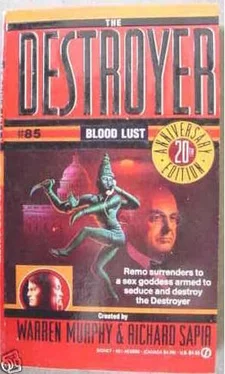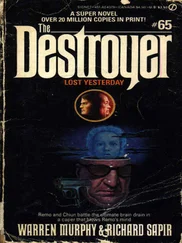Bending over, she removed his gag. It flashed before his eyes, and he saw for the first time that it was of silk. Yellow. No wonder it had felt so fine in his mouth. It had reminded him of the silk sheets on which he had passed many nights with the good Arab woman who had been too good for him.
"If you have abducted me for ransom," he told the woman, "you have wasted your time."
The woman's violet eyes flashed. She turned to the others.
"Fools! This is a mere fellahin. He smells of dung. He is not the sheik's son."
"I am the sheik's son," former Prince Abdul insisted, gathering the ragged shreds of his pride around him.
Another figure stepped forward. He wore a black silk costume like a thobe, two tigers stitched on the chest. An American, from the look of him. His eyes were like gems of death.
"That is he," the man said in numb English. "That is Abdul Fareem."
"But he smells," the woman said, also in English. American English. She sounded like his wife. The loose one. He wondered why she wore the abayuh.
The man in the black tiger costume shrugged.
"He is an Arab," he said woodenly.
"My father will not ransom me," Abdul said in English.
"That is well," the woman said. "The money he will save can be put to your burial."
And at that, the video cameras began whirring.
The woman in the abayuh stood up. She faced the man in the silken regalia. "There is your first sacrifice to me. Lay his broken corpse at my feet."
And with tears coming into his cruel dark eyes, the vision in black silk strode forward. His strong hands lifted, the cables and thews of his thick wrists working and pulsing, as if fighting the task the hands were about to undertake.
Abdul Fareem felt implacable fingers take him by the neck. They lifted him, bringing pain to his strained neck vertebrae.
Inexorably his face was brought up to eye level of the man he understood Allah had ordained to be his executioner.
Fingers dug in. The pain came so quickly that Abdul Fareem's frightened brain seemed to explode in his very skull like a hand grenade.
The world went red. Then black. Then away.
Before his ears died, he heard the man's voice-twisted, as if he too were dying.
"I'm sorry," he choked. "I can't help myself."
And behind his pain, the American woman in the abayuh laughed and laughed and laughed like the drunken church bells of the infidels.
Sickened, Remo Williams dropped the limp corpse. It fell like a great bag of meat, shaking the sands. He stepped back. The lights blazed in his tormented eyes. Kimberly Baynes drew near. She pushed the yellow silk scarf into one of his limp hands.
"You may have the honor of tying the rumal of Kali about his throat," she said. "For you are now my chief phansigar."
Remo knelt and did as he was bidden. He regained his feet. His stomach felt like an old kettle that had collected rusty rainwater. He wanted to vomit it up, but he could not. He had been instructed not to.
Kimberly Baynes stood looking down at the cooling corpse. Her violet eyes flared avidly. She saw a dab of blood at one corner of Abdul Fareem's slack mouth.
She fell on it eagerly and began licking like a dog.
It was then that Remo Williams lost control. He fell to his knees and emptied out the contents of his stomach into the desert sand.
"Don't bother getting up, lover," her mocking voice called over. "You have hungered to mate with me since when we last met. This plump carrion we have together made shall be our nuptial bed. And he will be only the first as we dance the Tandava that will stir the Caldron of Blood and remake this planet into a Hell of Delight."
And despite his revulsion, Remo felt his manhood stiffen as if about to burst blood at the tip from desire. Like a whipped dog, he crawled toward her.
And he wept.
Chapter 37
Harold Smith waited until Maude was asleep.
Slipping out of bed, he went to the hallway and padded in his ancient slippers to the end of the corridor, where he reached up for the pullcord that lowered the folding staircase to the attic.
The stairs creaked from disuse. Smith pulled them up after him, and only then turned on the light with a twist of a turn-of-the-century rheostat.
Since only Harold Smith ever ventured into his own attic, it was as tidy as the proverbial pin. A few old steamer trunks sat stacked neatly at the far end, covered with the fading labels of many half-forgotten trips. Nearby, his old army colonel's uniform-which still fitted-hung on a wooden coat hanger from the ceiling, protected by a dusty plastic dry-cleaning bag.
Smith ignored these artifacts. He went instead to a nest of electronic equipment, dominated by a modern videotape deck attached to a 1950's Philco TV set. Beside it, on the floor, sat an old-fashioned reel-to-reel tape recorder.
Smith knelt before the array. Although most of the equipment was antiquated, it still worked and was actuated by state-of-the-art sensors that he had secretly planted in the house next door-Remo's home.
Smith turned the tape recorder on, his face glowing cherry red from the tiny bubble monitor light. He jerked the lever that sent the tape wheeling back, stopped it with another twist, then hit the stainless-steel play button.
The quiet buzz of dead air came from the cloth speaker grille. Smith repeated the operation and got the same response.
Unlike the sound-actuated tape recorder, the video camera ran continuously. Smith checked it every day, and had even after Remo had vacated the house. The dwelling remained a security risk until it had been sold, owing more to Chiun's trunks than anything else. The Master of Sinanju had been in the habit of recording his assignments on his scrolls. No doubt sensitive, if distorted, information on CURE operations could be found in those scrolls.
Smith turned on the TV. A snowy black-and-white picture showed the dim outlines of a room. Smith stopped recording and rolled back the tape to approximately 8:45 that evening: the time his wife had pinpointed as when she had seen-or apparently seen-Chiun.
Smith watched a replay of the same dim room in silence. Minutes crawled past. Then a white light appeared.
Smith gasped.
The light devolved into the half-transparent image of a familiar kimono-clad figure.
The Master of Sinanju faced away from the camera. But the bald back of his head was unmistakable. It was Chiun. He stood immobile for perhaps three minutes. Then he simply faded away, leaving no trace.
Harold Smith turned off the recorder. Resetting everything, he padded back to the folding stair.
Dawn found him next door examining the darkened living room in his flannel bathrobe, purchased in 1973 at a yard sale and still serviceable.
The room was unremarkable, as was the floor where the apparition had appeared.
Smith stood on that spot, mentally summoning up every kernel of knowledge he possessed that related to paranormal phenomena. Smith did not believe in the paranormal, but over the years he had been exposed to enough imponderables that his once-razorlike skepticism had been dulled to a vaguely suspicious curiosity.
The room itself was unremarkable. No cold spot. He checked each window, knowing that lightning flashes had the ability to imprint the photographic image of a person who stood too close the glass. No angle of examination revealed a lightning-flash print, however. Not that he expected to find one. His video camera had absolutely picked up a three-dimensional phenomenon.
When he had exhausted every possibility, Harold Smith prepared to go.
He was walking to the kitchen when the light grew. It was lavender. Like a distant flare.
"What on earth?" Smith whirled. His gray eyes fluttered in disbelief.
The Master of Sinanju stood only inches away, looking stern and vaguely afraid.
Читать дальше



